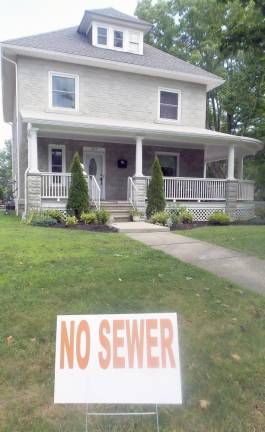What’s our Plan B? Saying no to central sewer plan and preserving our quality of life

To the Editor:
I read with interest the Pike County Dispatch article of Thursday, Oct. 15. The article was titled “Councilmen Seek to Clear Sewer Plan Misinformation.” The article was less an interview than a scripted attempt to further the central sewer cause.
It was stated that there is a vocal “minority” opposed to central sewage. Based on conversations, emails and yard signs this is not a vocal minority. If it were, why not put the ACT537 approval on the upcoming ballot as a referendum?
In an earlier article in The Pike County Courier from Aug. 13, “The Sewer War is on,” there is the comment from a borough council member which stated, the ultimate decision rests with the council: “It also would not be fair to have the majority of the borough make that decision for others.” I disagree completely. This central sewage plan if enacted will ultimately affect every resident undoubtedly not for the better. Start first with more congestion on our roads, and an additional strain our stretched services; this will also lead to high density development down the 6&209 corridor to the borough.
A further quote from a council member: “If you can’t open restaurants we are not going to be a tourist town.” Prior to COVID we had 403 Broad, Bar Louis, The Fauchere, the Waterwheel, Dimmick, pizza places, a microbrewery a Chinese restaurant, Spoonful, and the Milford Diner. How many more restaurants do we need, or can we support?
The Tom Quick Inn was used as an example of why central sewage is a must. Lack of central sewage supposedly has kept the Tom Quick from being sold. Interestingly enough, as of this writing, the Tom Quick Inn has been purchased, renovations are ongoing, and there is a liquor license application posted in the window. Add to that the gas station that has been sitting idle for years across from the post office. There is an application pending for an independently owned take-out burger restaurant, also without the need for central sewage. This is the type of organic economic growth we need and are getting.
No central sewer article would be complete without a discussion on grinder pumps. The article states that the initial cost of the grinder pumps will be covered by the “grant money.” However, once it’s on your property, it becomes the property owner’s responsibility as far as maintenance and repair. The cost figures and longevity quoted certainly come under question. Doing a simple search on these two metrics yielded the following: one, the lifetime of grinder pumps before maintenance or replacement is required is about 6-8 years, not 17! The replacement and installation cost is around $4,000-$5,000. This data is from Acorn Park Neighborhood Assoc., Prince William County, Va., and the Citizens Energy Group. Additional sources are available, but you get the idea.
As for the initial connection itself, step one is pump out the existing septic or cesspool, fill in the septic or cesspool. Dig up your yard, potentially uproot fencing, shrubs, trees and pavers to connect to the sewer line. Those costs are on the property owners. If your septic or cesspool is in the back yard and you’re on one of the designated connect zones, you may have to re-route your internal plumbing to connect. Lest we forget that if there is a power failure you had better not run any water after two days unless you have an emergency generator to run the grinder pump. From a safety standpoint with grinder pumps if you smell anything in your basement or outside, that could be hydrogen sulfide which is extremely dangerous. All of this adds up to a major expense, certainly not the $2.5K as mentioned.
It makes absolutely no sense to pump an additional 70K gallons a day of treated effluent into the Delaware as opposed to having cesspools pumped at certain long intervals. The Westfall plant will need continued maintenance and upgrades to assure they are removing ever changing chemicals and drugs. This quote from the Scientific American, “Only about half of the prescription drugs and other newly emerging contaminants in sewage are removed by treatment plants.”
The question posed in the article is, “What’s the Opposition’s Plan B?” Not passing the ACT537 and preserving our quality of life, that’s our Plan B.
Fred Weber
Milford